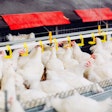
New artificial intelligence technology can help integrators save money and get better flock performance by facilitating investigation and decision making.
As part of the Virtual Poultry Tech Summit 2020, Evan Sadlon, lead data scientist for MTech Systems USA LLC, and Aditya Madhavan, a business consultant for M-Tech, presented on new solutions identified by artificial intelligence (AI) powered software. They spoke on October 21, 2020.
Specifically, they showed how data analysis was able to investigate past results to help find faulty settings in an incubator and can help predict the future and make more informed decisions such as how to best balance flock density with flock performance.
How it works
Madhavan said the M-Tech approach for AI analyzation of so-called big data, or a set of information so large it cannot be processed without computation, is to take a wide look at the entire dataset rather than just looking at one or two things. They call this practice feature importance. For the poultry industry, that means considering the entire grow-out process from egg to package rather than individual performances of technical advisors and farms in the field.
Sadlon says using featuring importance, the AI will rank the input data it is given and decide how important each feature was – age at slaughter, weather during the grow-out, technical advisor – in achieving a specified result.
Finding incorrect incubator settings in the slaughterhouse
Sadlon said one client said it was having issues with condemnations at processing, so it reached out to M-Tech to analyze the operation. M-Tech looked at the data and ran predictive models touching on issues such as the tech advisor raising the flock and the age of the breeder. Eventually through this process, M-Tech came upon the hatchery. It looked at the data and realized that a handful of the client’s hatcheries were correlated with flocks with a higher than normal risk for condemnation.
M-Tech and the client found more data, this time related to the incubation at those hatcheries, and found out that a number of specific incubators and hatchers were not set correctly, leading to poor performance at the end of the bird’s life.
“Once we found that out, they were able to fix those machines and within a couple of cycles everything was back to normal,” Sadlon said.
Balancing flock density with flock performance
Along with investigation of past results, AI can be used to optimize future results. Sadlon spoke about another instance where M-Tech and a client looked at so-called big bird weights and used a predictive model program to find out which factors are most important to achieving the desired weight. From there, they determined which factors are controllable and which aren’t. That way, it could help determine how to hit the target weight with the lowest cost.
In this case, M-Tech found a relationship between flock density and bird weight. However, it’s well known in the industry that higher flock density – or putting more birds in the house at the same time - generally leads to poorer performance and welfare outcomes. Sadlon said the AI prediction was able to determine exactly how much performance suffers, or improves, based upon the number of birds per square foot.
“Now we can say, 'By doing this density, I increase the amount of birds I place by 10 percent but I only take a 7 percent hit on performance,'" Sadlon said. "If you are trying to produce as many birds as possible in that weight range, you can then back into it and say I know I need it at this weight what is the maximum density I can get there while still being in that target range."
Sadlon says this enables making informed business decisions. Instead of just trying growing strategies or feed formulations, integrators can look at the data of their past results and build AI-powered predictions to enable changes that are more likely to be successful.
Attend the 2021 Poultry Tech Summit
Join an exclusive international gathering of industry-changing innovators, researchers, entrepreneurs, technology experts, investors and leading poultry producers at the 2021 edition of Poultry Tech Summit on October 31 - November 2 in Atlanta, Georgia. Attendees can expect the same groundbreaking innovation and insightful presentations that made the previous events well-attended with deep dialogue on new prospective solutions and developing technologies.


















